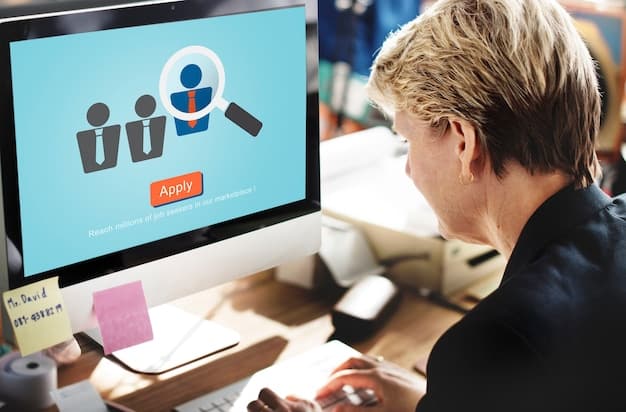AI in HR: Cutting Employee Turnover by 8% in US Firms by 2025

AI in Human Resources is projected to significantly reduce employee turnover in US companies, with forecasts indicating an 8% decrease by 2025, driven by improved hiring processes, personalized employee experiences, and proactive retention strategies.
The landscape of Human Resources is rapidly evolving, and at the forefront of this transformation is the integration of AI in Human Resources: Reducing Employee Turnover by 8% in US Companies by 2025. As US companies grapple with the challenges of employee retention, artificial intelligence offers innovative solutions to attract, engage, and retain top talent.
Understanding the Rise of AI in HR
The integration of Artificial Intelligence (AI) into Human Resources is no longer a futuristic concept but a present-day reality. AI is reshaping HR functions, offering solutions that range from automating routine tasks to providing deeper insights into employee behavior and performance.
AI’s ability to process large datasets, identify patterns, and predict outcomes is revolutionizing how HR departments operate. This technology enables HR professionals to make data-driven decisions, streamline processes, and create more personalized employee experiences.
Key Areas of AI Application in HR
AI is being applied across a wide spectrum of HR functions, each offering significant improvements in efficiency and effectiveness.
- Recruitment and Talent Acquisition: AI-powered tools can analyze resumes, conduct initial screenings, and even predict the success of potential hires.
- Employee Engagement and Retention: AI can track employee sentiment, identify potential turnover risks, and provide personalized recommendations to improve engagement.
- Learning and Development: AI can personalize training programs, identify skill gaps, and provide targeted learning resources to employees.
By leveraging AI in these key areas, HR departments can significantly improve their performance, reduce costs, and create a more engaged and productive workforce.
In conclusion, AI is transforming HR by automating tasks, providing insights, and improving decision-making. As AI technology continues to advance, its applications in HR are expected to grow, further enhancing the effectiveness and efficiency of HR functions.
AI-Driven Recruitment Strategies for Better Hiring
One of the most significant ways AI is impacting HR is through its ability to transform recruitment strategies. Traditional recruitment processes can be time-consuming and prone to biases, but AI offers a more efficient and objective approach to finding the right talent.
AI-powered recruitment tools can analyze vast amounts of data to identify candidates who not only possess the required skills but also align with the company’s culture and values.

How AI Enhances the Recruitment Process
AI is revolutionizing recruitment by automating tasks, improving candidate matching, and reducing bias.
- Automated Resume Screening: AI can quickly scan thousands of resumes, identifying candidates who meet the specified criteria.
- Predictive Analytics: AI can analyze historical data to predict the success of potential hires, reducing the risk of bad hires.
- Chatbots for Initial Screening: AI-powered chatbots can conduct initial screenings, answering candidate questions and gathering information.
By implementing these AI-driven strategies, companies can significantly improve their recruitment process, reducing time-to-hire, and improving the quality of hires.
In summary, AI is transforming recruitment by automating tasks, improving candidate matching, and reducing bias. Companies that adopt AI-driven recruitment strategies can gain a competitive advantage in the war for talent.
Personalized Employee Experiences with AI
Creating personalized employee experiences is crucial for enhancing engagement and reducing turnover. AI enables HR departments to tailor employee interactions, providing personalized support, training, and career development opportunities.
AI can analyze employee data to understand individual needs, preferences, and goals, allowing HR to create customized experiences that resonate with each employee.
The Benefits of Personalized Experiences
Personalized employee experiences can lead to increased engagement, productivity, and retention.
- Tailored Learning and Development: AI can identify skill gaps and recommend personalized training programs.
- Personalized Onboarding: AI can create customized onboarding experiences that help new hires acclimate to the company culture.
- Personalized Feedback and Coaching: AI can provide personalized feedback and coaching to help employees improve their performance.
By creating personalized experiences, companies can demonstrate that they value their employees, leading to increased loyalty and commitment.
In conclusion, AI enables HR to create personalized employee experiences that enhance engagement, productivity, and retention. Companies that prioritize personalization can create a more positive and supportive work environment.
AI-Powered Tools for Identifying Turnover Risks
One of the most valuable applications of AI in HR is its ability to identify employees who are at risk of leaving the company. By analyzing various data points, AI can predict turnover with a high degree of accuracy, allowing HR to take proactive measures to retain these employees.
AI-powered tools can monitor employee sentiment, track performance metrics, and analyze communication patterns to identify potential flight risks.

How AI Predicts Turnover
AI uses various data points to predict turnover, providing HR with valuable insights.
- Sentiment Analysis: AI can analyze employee communication to gauge their sentiment and identify signs of dissatisfaction.
- Performance Monitoring: AI can track performance metrics to identify employees who may be struggling or disengaged.
- Behavioral Patterns: AI can analyze employee behavior to identify patterns that are indicative of turnover, such as decreased participation in company events.
By identifying employees at risk of leaving, HR can implement targeted interventions to improve their experience and increase their likelihood of staying.
In summary, AI-powered tools can identify turnover risks by analyzing employee data, providing HR with valuable insights. By taking proactive measures to retain these employees, companies can reduce turnover and save on recruitment costs.
Addressing Ethical Considerations in AI-Driven HR
As AI becomes increasingly integrated into HR, it’s essential to address the ethical considerations that arise. AI algorithms can be prone to biases, leading to unfair or discriminatory outcomes if not carefully managed.
HR departments must ensure that AI systems are transparent, accountable, and unbiased to avoid perpetuating existing inequalities.
Ensuring Fairness and Transparency
To address ethical concerns, HR departments should implement the following measures:
- Data Privacy: Ensure that employee data is collected and used in accordance with privacy regulations.
- Bias Mitigation: Regularly audit AI algorithms for bias and take steps to mitigate any identified biases.
- Transparency: Be transparent with employees about how AI is being used to make decisions that affect them.
By prioritizing fairness and transparency, HR departments can build trust with employees and ensure that AI is used in an ethical and responsible manner.
In conclusion, addressing ethical considerations is crucial for ensuring that AI is used responsibly in HR. By prioritizing fairness, transparency, and accountability, HR departments can build trust with employees and avoid perpetuating existing inequalities.
Measuring the Impact of AI on Employee Turnover
To determine the effectiveness of AI in reducing employee turnover, it’s essential to measure the impact of AI initiatives. This involves tracking key metrics, such as turnover rates, employee engagement scores, and recruitment costs, before and after the implementation of AI tools.
By analyzing these metrics, HR departments can gain insights into the ROI of AI investments and identify areas for improvement.
Key Metrics to Track
Several key metrics can be used to measure the impact of AI on employee turnover.
- Turnover Rate: Track the percentage of employees who leave the company over a given period.
- Employee Engagement Score: Measure employee engagement using surveys, feedback sessions, and other methods.
- Recruitment Costs: Track the costs associated with recruiting and hiring new employees.
By monitoring these metrics, HR departments can assess the effectiveness of AI initiatives and make data-driven decisions to optimize their HR strategies.
In summary, measuring the impact of AI on employee turnover is essential for determining the ROI of AI investments. By tracking key metrics, HR departments can gain insights into the effectiveness of AI initiatives and identify areas for improvement.
| Key Area | Brief Description |
|---|---|
| 🔍 AI Recruitment | Automates resume screening, and predicts candidate success. |
| ❤️ Personalized Experiences | Tailors employee support, training, and development opportunities. |
| ⚠️ Turnover Risk | Identifies at-risk employees by monitoring sentiment and performance. |
| ⚖️ Ethical Use | Ensures fairness, transparency, and data privacy in AI implementation. |
FAQ
▼
AI streamlines recruitment by automating resume screening, predicting candidate success, and using chatbots for initial screenings, thus improving efficiency and reducing biases in the hiring process.
▼
Personalized employee experiences, powered by AI, enhance engagement, productivity, and retention by tailoring learning, onboarding, and feedback to meet individual employee needs and preferences.
▼
AI predicts turnover by analyzing data points like sentiment, performance, and behavior patterns to identify employees who may be at risk of leaving, allowing HR to implement proactive retention strategies.
▼
Ethical considerations include ensuring data privacy, mitigating biases in algorithms, and maintaining transparency with employees about how AI is used to make decisions that affect them.
▼
Companies can measure AI’s impact by tracking turnover rates, employee engagement scores, and recruitment costs before and after AI implementation to assess ROI and identify areas for improvement.
Conclusion
The integration of AI into human resources promises significant advancements in reducing employee turnover for US companies by 2025. By leveraging AI-driven recruitment, personalized employee experiences, and proactive turnover risk identification, organizations can cultivate more engaged, satisfied, and loyal workforces. As AI technologies continue to evolve, their ethical and strategic implementation will be paramount in creating a sustainable competitive advantage.





